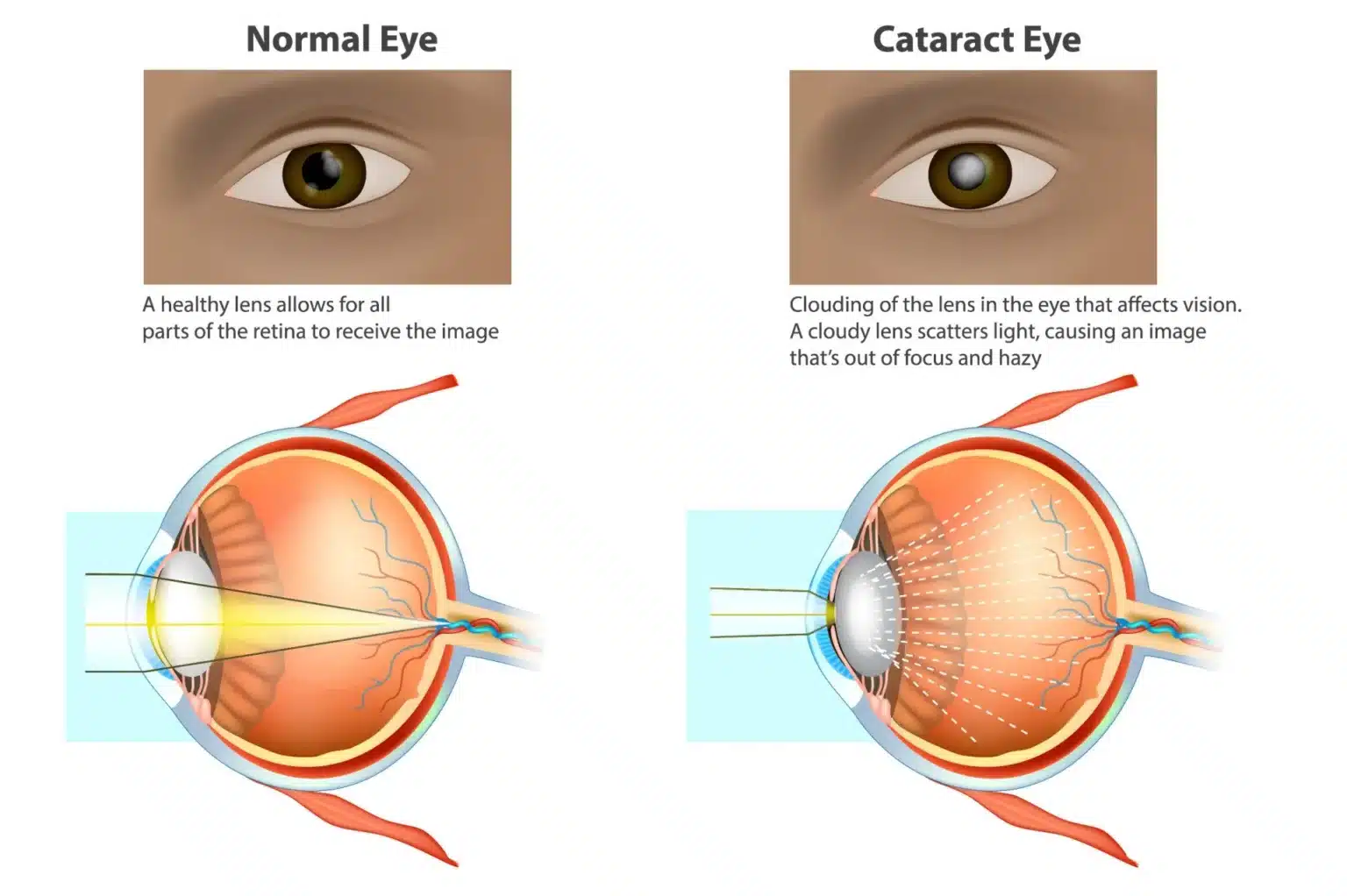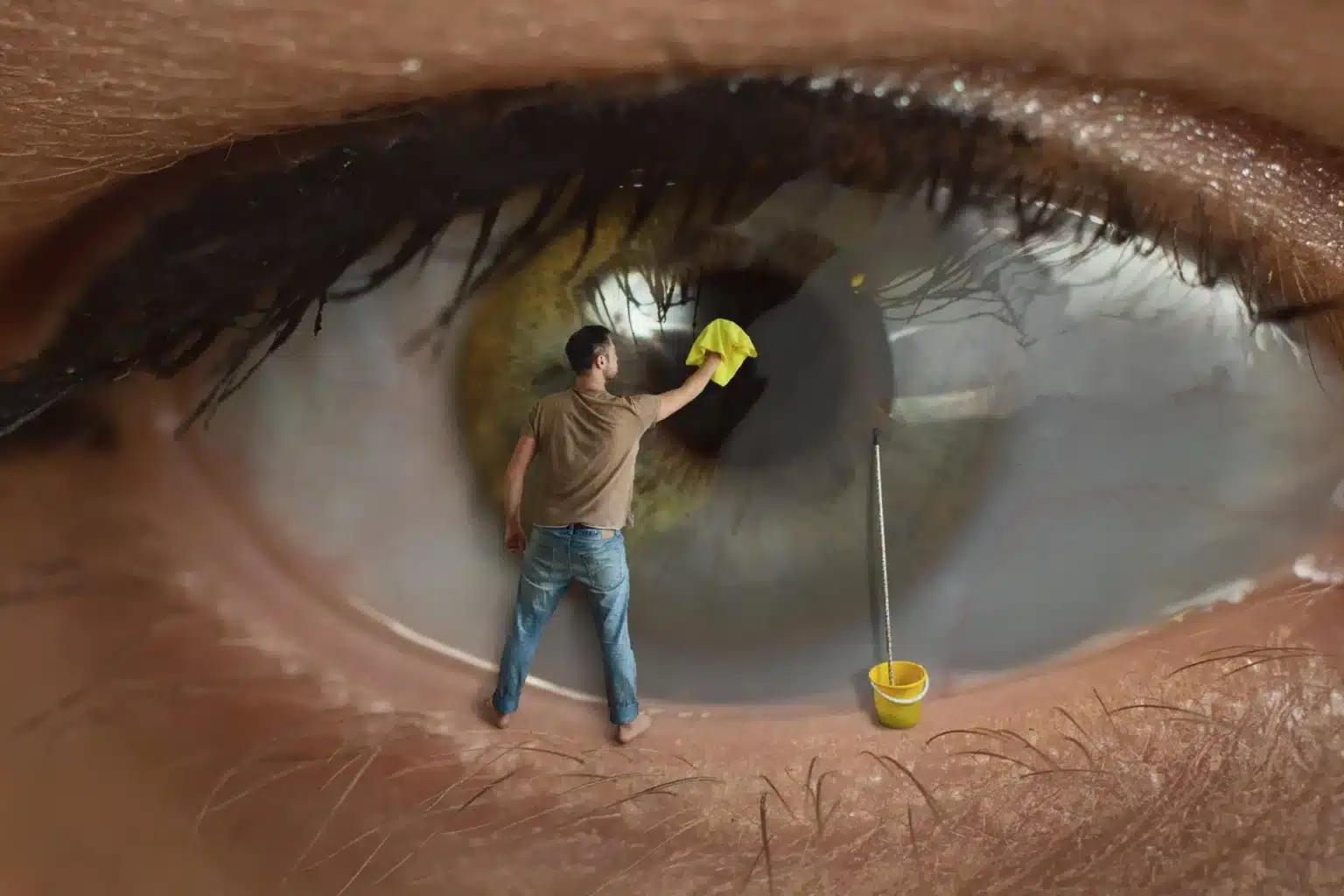Did you know that more than half of all Americans above the age of 80 will either have or have had a cataract(s) at some point in their life? It’s one of the most common eye problems as we grow older and while it’s a result of the natural aging process, it can heavily impact vision quality.
A cataract is clouding of the eye’s natural lens, which is normally crystalline clear. Over time, the proteins inside the lens begin to break down and clump together – creating a cloudy area in your field of vision. A cataract can happen in just one eye or both eyes at the same time.
The most common syfmptoms of a cataract are blurred vision (almost like you’re looking out of frosted glass or a foggy window), faded colors, difficulty seeing at night, light sensitivity, seeing halos around lights, double vision, and frequently changing your glasses prescription.
What Activities Should be Avoided After Cataract Surgery?
Cataracts can severely impact an individual’s ability to see clearly and, in turn, can have a negative impact on the individual’s quality of life – though symptoms are unnoticeable in the early stages of development. Over time, the symptoms will grow worse and more significant.
As the condition progresses, your eye doctor will likely recommend cataract surgery – the only way to remove a cataract. During surgery, your eye doctor will replace your eye’s natural lens with a new, clear artificial lens (known as an intraocular lens or IOL). Results happen quickly.
While over 90% of patients who undergo cataract surgery will notice an improvement in vision following surgery. Of course, a majority of the results are dependent on how well the patient follows instructions throughout the recovery process. If precautions aren’t met, trouble awaits.
Let’s take a look at what activities should be avoided after cataract surgery:
Swimming
Swimming after cataract surgery can severely damage the eye and compromise the healing process. To avoid this, patients should steer free of entering a pool or hot tub – even if you’re confident you can keep your head above water. In general, water in the eyes should be avoided.
Driving
When can you drive after cataract surgery? Most eye doctors recommend waiting at least 24 hours before getting behind the wheel – though it’s best to wait 2-3 days to ensure you can see the road properly and aren’t impacted by the light sensitivity. Use your best judgment here.
Wear Eye Makeup
How long after cataract surgery can you wear makeup? Since the eyes are much more prone to an infection after cataract surgery, you should avoid wearing makeup for at least one week or until you see your eye doctor for the follow-up appointment – they’ll let you know if it’s safe yet.
Exercising & Other Strenuous Activities
It’s best to avoid strenuous physical activities after cataract surgery until the eye has fully healed. You can start light physical activities one or two weeks after surgery. With that said, wait for your doctor’s consent before doing any intense workouts, weightlifting, or hardcore exercises.
Rubbing Your Eyes
This is something you should avoid doing at any time – whether you have healthy eyes or just had cataract surgery. With that said, you can expect your eye to be irritated and/or itchy for several days after cataract surgery. If it persists longer than that, contact your eye doctor.
Other Precautions After Cataract Surgery
By avoiding the five things listed above, you’re limiting your chances of experiencing issues and complications following cataract surgery – which should be everyone’s goal, if they’re seeking improved vision. Of course, those are just some of the directions your eye doctor will provide.
Let’s take a look at some of the other precautions after cataract surgery:
- Avoid areas with high levels of dust, wind, pollen, and dirt to prevent anything from getting in or irritating your eyes
- Make sure you wear sunglasses when outside, especially on a sunny day
- Eat a healthy, well-balanced diet on a regular basis
- Get enough quality sleep each night
- Avoid getting water in the eyes, even when showering or washing your face
- If your doctor has you using eye drops, follow instructions carefully
- If your doctor has you wearing an eye shield at night, don’t forget to wear it
While cataract surgery usually results in improved vision, that doesn’t mean everyone will have success with the surgery. In fact, a majority of issues arise during the recovery process and they’re usually the product of not following directions or taking the necessary precautions.
Cataract Surgery Recovery Period Timeline
Most patients notice an improvement in vision right away and while a majority of the soreness or discomfort will disappear over the course of 2-3 days, patients generally don’t fully recover until four to six weeks following surgery. At that point, vision will be better than it was before surgery.
Immediately after surgery, you can expect watery eyes, slightly blurred vision, light sensitivity, and irritation. You’ll have several follow-ups with your eye doctor over the course of the next few weeks. During that time, your doctor will update his recommendations and directions for you.
For example, you can start to do light exercises (walking, stretching, etc.) after one week, moderate exercises (jogging, yoga, etc.) after two weeks, and more intense exercises after four to six weeks. As you progress through recovery, your activity limitations won’t be as restrictive.
Are You a Candidate for Cataract Surgery?
Have you recently experienced symptoms of a cataract in one or both of your eyes? Are your cataracts impairing your vision, making it difficult to see clearly, and/or damaging your ability to live a quality life? If you answered ‘yes’ to any of the questions above, then contact us today!
At Milwaukee Eye Surgeons, we understand how irritating cataracts can be and are dedicated to helping our patients find relief with improved vision. We’ll be with you every step of the way and will ensure you’re given the proper guidance and directions throughout the recovery process.
Contact us today to learn more about our office and how we can improve your vision long-term!


